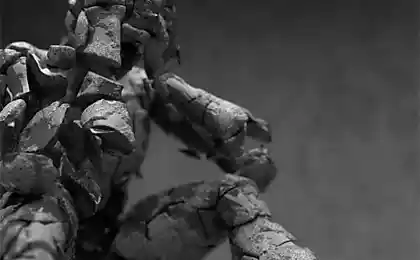167
How to get rid of parasitic words and become a master of words

Greetings, seekers of perfection! If you are reading this, you are on the right track. You've realized that speech isn't just a way to exchange information. It is the instrument of your power over reality, the mirror of your thinking and ultimately of your success. We utter thousands of words every day, but have you ever wondered if there could be real pests? We are talking about parasitic words - these uninvited guests who, like weeds, fill the garden of your eloquence, depriving it of beauty and strength.
At first glance, what is so innocuous about “type”, “like” or “well”? Well, think about it, the man said a couple of times. But that's just the tip of the iceberg. In fact, these little word traps can seriously undermine your credibility, ruin your impression, and even create a barrier between you and your interlocutors. They are like murky divorces on clean glass, through which you try to show the world your bright and unique inner world. It is time to take this tool into your own hands and hone it to perfection.
Why are parasitic words a serious problem?
For many, parasitic words are just a habit. But psychologists and linguists see much more in them. They are signals that we unconsciously give to others, revealing our hidden insecurities and thoughts. Let's look at this from a different angle. Your speech is a projection of your personality into the material world. Every word spoken has its own weight and vibration. When you clog it up with erm and shorter, you reduce that vibration, weakening your own “momentum of life.”
- They create barriers. Instead of focusing on your brilliant idea, the interlocutor is forced to “plow through” the word garbage. It's exhausting and annoying.
- They betray insecurity. Pauses filled with "ums" and "wells" often appear when a person tries to buy time to formulate a thought. It's as if you're constantly fixing your tie during an important performance.
- They impoverish speech. The more parasitic words, the less space there is for really meaningful and beautiful phrases. Your speech becomes flat and inexpressive.
- They create a negative image. They may perceive you as incompetent or unserious, even if it is far from the truth. Imagine a lawyer who says “as if” in court. Not very convincing, is it?
Speech, like thinking, must be clear and accurate. Every word is a step back from the truth.

Parasitic Words Like a Mirror of the Soul: What Do They Say About You?
This is perhaps the most intriguing part of our story. Parasitic words are not just a habit, they are a kind of psychological code. If you learn to decipher it, you can learn a lot about yourself and about others. According to the Scientology paradigm, the words we choose reflect our inner state and level of awareness.
- "Just." The word is often used as an attempt to simplify a difficult situation or absolve oneself of responsibility. “I just wanted to say...” may be a sign of insecurity.
- "Really." Frequent use of this turnover may indicate that a person is inclined to dogmatism. He wants to emphasize that his point of view is the only correct one.
- "Short." A person who constantly uses this word may be seeking to compress information, unable or unwilling to fully unfold the thought. This may indicate impatience or even a desire to dominate the conversation.
- "Type," "like." These parasitic words are a kind of "shield." A person uses them in order not to be categorical, to leave himself "space for maneuver." This can be a sign of fear of responsibility or fear of judgment.
Think about the parasitic words that live in your speech. This is not a reason for self-flagellation, but an opportunity for self-discovery and growth. Once you understand the cause, you can deal with the consequences much more effectively. This is the first and most important step towards purifying and elevating your verbal flow.
Magical practices for gaining verbal purity
Your speech is your temple. It's time to clean it up.
Getting rid of parasitic words isn’t just about removing them from your vocabulary. This is a full-fledged spiritual and intellectual training. This is not a sprint, but a marathon that requires awareness and discipline. But the result is worth it. You will not just get rid of the garbage, you will gain a new level of freedom and confidence.
- Practice conscious reading. Read it out loud. Do not just “run” through the text, but say each word, trying to convey the intonation and meaning as accurately as possible. Classical literature is your best friend. Pushkin, Chekhov, Bradbury – these masters of words will help you feel how beautiful and pure speech should sound.
- Audio-mirror technique. Record your conversations on a tape recorder. It may sound awkward, but it’s the most effective way to listen to yourself. Listen to the tape. You will be amazed at how many extra sounds and parasitic words you will find. Your inner critic is your most honest coach.
- A penalty score game. Talk to friends or family about a fun game. For each word-parasite you will pay a small “penalty” – a coin, candy or even push-ups. This will turn routine work on yourself into an exciting competition, and “loss” will become a powerful motivator.
- Visualization. Every time you want to say a parasitic word, imagine that word is a small, gray pebble that falls into the clear stream of your speech, muddying it. Visualize you inserting a beautiful, sparkling gem instead - a bright, accurate word.
- Replacement. When you feel like a pause is inevitable, instead of a "uh-uh," just take a breath. Breathing is not just a physiological process, it’s a moment when you gather your thoughts, rather than filling the void with verbal garbage.

Glossary
Key concepts
Parasitic words
Automated, meaningless words and sounds that a person unknowingly inserts into their speech to fill pauses. They do not carry a semantic load, but can distort the perception of information and the image of the speaker.
Oratory art
The skill of effective and convincing public speaking, based on competent speech, logical structure and ability to emotionally influence the audience. Pure speech is an integral part of it.
Cognitive linguistics
A branch of linguistics that studies the relationship between language and thinking. The words we use reflect our mental patterns, beliefs, and unconscious attitudes. Thus, parasitic words can serve as markers of psychological states.
Getting rid of parasitic words is not just a whim or following fashion. This is a fundamental step towards gaining control over yourself and your life. When you clear your speech, you clear your thinking. When you speak beautifully and consciously, you create your reality, not just react to it. Every word you say is a brick in the foundation of your future. Make these bricks strong, beautiful and meaningful.























